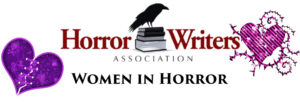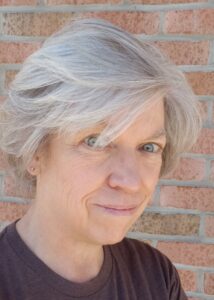Women in Horror: Interview with Carol Gyzander

 Carol Gyzander writes and edits horror and science fiction. She focuses on strong women with twisted tales that touch your heart. She brought a female focus to her Bram Stoker Award®-nominated story, “The Yellow Crown,” inspired by Robert W. Chambers’ world of the twin suns.
Carol Gyzander writes and edits horror and science fiction. She focuses on strong women with twisted tales that touch your heart. She brought a female focus to her Bram Stoker Award®-nominated story, “The Yellow Crown,” inspired by Robert W. Chambers’ world of the twin suns.
Her cryptid novella, Forget Me Not, occurs near Niagara Falls in 1969/1939; she co-edited the Even in the Grave ghost story anthology with James Chambers. The reversal of Roe v. Wade inspired the horror anthology she co-edited with Rachel A. Brune, A Woman Unbecoming; it presents stories of women’s rage, power, and vengeance, and benefits reproductive healthcare services.
Carol is one of the HWA Chapter Program Co-Managers and with James Chambers, she is Co-Chair of the HWA NY Chapter. She co-hosts the online Galactic Terrors reading series and you can find her at CarolGyzander.com
What inspired you to start writing?
I attended a luncheon where mystery author Harlan Coben, who lived in my town, gave a talk about plotting a mystery book. It sounded like fun! I subsequently wrote a mystery (which I will go back and look at someday) and then got drawn into science fiction.
What was it about the horror genre that drew you to it?
I’d been writing cyberpunk—a pretty dark subgenre of science fiction—when I met Teel James Glenn and attended one of his readings with the HWA NY Chapter. I loved the stories and the people which led me toward the dark side. It resonated with me, as I had watched and read a bunch of dark stuff since my parents woke me up at midnight when I was six to watch the original Little Shop of Horrors movie on late-night TV.
Do you make a conscious effort to include female characters and themes in your writing and if so, what do you want to portray?
I say that I focus on strong women with twisted tales that touch your heart. I like to explore characters, particularly women, who face something awful but then find inner strength and resources they may not have realized they had. Bonus if they work together and not against each other!
What has writing horror taught you about the world and yourself?
There are many things that affect us in this world—some positive and some not so much: sexism, racism, climate change, pandemics, mental illness. We can either choose to ignore these less- positive factors with fingers in our ears and eyes covered, or figure out a way to examine them. Take back some control. Writing (and reading) horror gives us a way to picture ourselves coming up against bad, dark forces—and, if not winning, at least gaining some understanding and control of their influence on us and exposing these factors to others.
How have you seen the horror genre change over the years? And how do you think it will continue to evolve?
We could say that horror evolves over time, mirroring changes in society because it focuses on the Other and what we are afraid of.
Horror novels have changed from centuries ago, when they focused on unsettling Gothic stories set in dark and gloomy castles and then Gothic romances such as Dracula and Frankenstein – most dealing with some supernatural elements.
The last century saw a focus on internal psychological conditions, looking at our inner fears, then the rise of splatterpunk-type works with a lot of graphic images that took hold in the 60s and the rise of slasher films in the 70s. Steven King brought horror more to the mainstream as many of his stories were developed into movies and mass-market books.
Horror has branched into more subgenres recently, such as urban fantasy and new weird horror. More representation by different people brings a wider viewpoint and focus to the genre, and I look forward to seeing this continue.
People talk about “elevated horror” these days as if addressing the human condition is a new thing, but it seems to me that this is more a term to entice non-horror fans into attending horror movies or reading books.
How do you feel women have been represented thus far in the genre and what hopes do you have for representation in the genre going forward?
I see a huge change from the American slasher movies of the last century, where (as Carol J. Clover points out) the early attacks against the final girl drew the audience into feeling subjugated and threatened as well. The final girl became a vicious attacker to overcome the danger – but only a clean, pure girl could become the final girl and survive.
Compare this to The Rust Maidens novel by Gwendolyn Kiste, where the heroine is an empathetic participant in the changes affecting the young women and helps the victims address their horror in the way they want. We’re not done with final girls, but there are also so many more ways of looking at women that address their strengths and compassion.
Who are some of your favorite female characters in horror?
Carrie, Ellen Ripley in Alien, the narrator in “The Yellow Wallpaper.”
Who are some women who write horror you recommend our audience check out?
So many! Lee Murray, Cindy O’Quinn, Anna Taborska, and Kyla Lee Ward—my fellow sister finalists for the Bram Stoker Award for short fiction last year.
Meghan Arcuri, Amy Grech, April Grey, Kathleen Scheiner, and others from the NY Chapter.
Mary SanGiovanni, Nicole Givens Kurtz, Michelle Renee Lane, Gwendolyn Kiste, Linda D Addison, Shawnna Deresch, L. Marie Wood, Bridgett Nelson, Sumiko Saulson, Donna Munro, Rachel Brune, Rosemary Thorne, Carina Bissett, Christa Carmen. I know I’m forgetting so many!
What is one piece of advice you would give horror authors today?
Make us care about somebody in the story and go from there.
And to the women who write horror out there who are just getting started, what advice would you give them?
Read widely, but write what is important to you and explore what interests you. Don’t worry about hitting the tropes or expectations, and don’t feel that you have to write slasher stories or ghost stories because that is all there is in horror; it’s a wide field. Horror is a flavor that can be added to any genre!




Great interview! Thanks for the mention!
Great interview, thanks Carol.